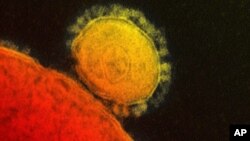China said on Friday a 44-year-old South Korean man had tested positive for Middle East Respiratory Syndrome (MERS), China's first confirmed case, but that it had not found any symptoms in 38 people who had been in close contact with him.
Health authorities in the southern Chinese province of Guangdong said it was likely the disease would spread as the patient had taken a bus, crossed a busy border checkpoint from Hong Kong and stayed in a hotel before being taken to hospital.
“As we have said before, the possibility of MERS transferring into Guangdong is very high,” He Jianfeng, director for the Guangdong Provincial Center for Disease Control, told reporters.
“In theory, it's possible to have a second case," He said, adding that 38 people found to have come into contact with the patient hadn't tested positive.
Virus identified in 2012
First identified in humans in 2012, MERS is caused by a coronavirus from the same family as the one that triggered China's deadly 2003 outbreak of Severe Acute Respiratory Syndrome (SARS). There is no cure or vaccine.
“The virus appears to be circulating widely throughout the Arabian Peninsula,” the World Health Organization (WHO) said on its website. “All recent cases that have been reported outside the Middle East first developed infection in the Middle East.”
WHO said on Friday 10 people in South Korea were confirmed as having MERS, but there had been no sustained human-to-human spread. The UN agency said that it was not recommending screening of passengers or that travel or trade restrictions be imposed on South Korea due to the outbreak.
“The virus is not behaving differently. It is direct transmission and not sustained human-to-human-transmission. They are all related to the same case who came traveling from the Middle East,” WHO spokesman Christian Lindmeier told a briefing in Geneva.
The patient, in isolation in hospital in the southern Chinese city of Huizhou, had a fever and a chest examination showed possible pneumonia, China's National Health and Family Planning Commission said.
“We understand he is currently in a stable condition, and is being well cared for,” the WHO China office said in a statement.
The man, who is a son of another patient who was confirmed last week to have been infected in South Korea, had traveled to Huizhou after first arriving in Hong Kong on Tuesday, according to South Korean and Chinese authorities.
Monitoring several people
Hong Kong health authorities said 29 people had been in close contact with the Korean in Hong Kong, with 12, including three Koreans, being kept in quarantine in hospital.
Of these, three were showing very mild symptoms, Leung Ting-hung, controller of Hong Kong's Centre for Health Protection, said. But the chances of an outbreak in Hong Kong were low.
Two new victims in South Korea are believed to have caught the virus from the first case confirmed last week, a 68-year-old man who had travelled to Bahrain in April and May, and returned to South Korea via Qatar.
Last week, South Korea's Health Ministry said there were 1,142 cases of MERS in 23 countries and 465 deaths had been reported by May 16.





